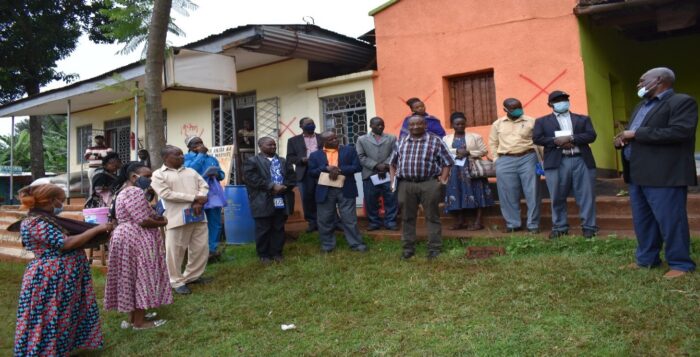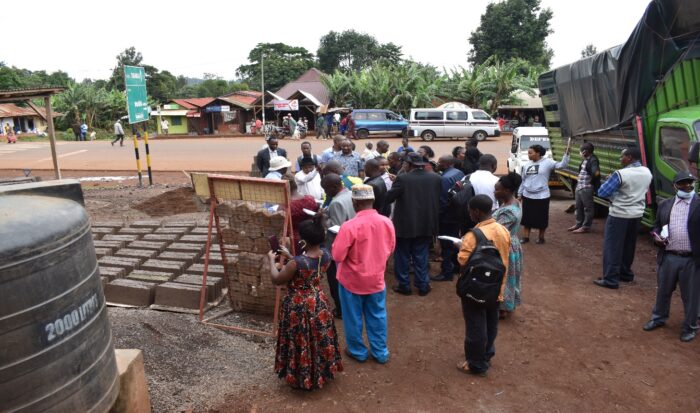 Building on the pioneering work of Equal Exchange in the previous round of the U.S. Agency for International Development (USAID)-funded Cooperative Development Program (CDP), NCBA CLUSA is educating cooperatives on the importance of member-driven capitalization plans as part of its current USAID CDP project Creating an Environment for Cooperative Expansion (CECE). As highlighted in Equal Exchange’s groundbreaking report, “Developing a strong capital base is one of the most critical issues facing group owned smallholder enterprises, cooperatives and associations in developing countries.”
Building on the pioneering work of Equal Exchange in the previous round of the U.S. Agency for International Development (USAID)-funded Cooperative Development Program (CDP), NCBA CLUSA is educating cooperatives on the importance of member-driven capitalization plans as part of its current USAID CDP project Creating an Environment for Cooperative Expansion (CECE). As highlighted in Equal Exchange’s groundbreaking report, “Developing a strong capital base is one of the most critical issues facing group owned smallholder enterprises, cooperatives and associations in developing countries.”
For cooperatives, building capital through member-owner practices such as individual member equity accounts and indivisible reserves are critical for becoming sustainable businesses that have financial resources to grow business operations, serve their members and communities in meaningful ways, and be prepared when they fall on hard times, as we have all experienced during the COVID-19 pandemic.
In February 2021, NCBA CLUSA’s local partner in Tanzania, Rural Urban Development Initiatives (RUDI), organized a learning exchange trip for leaders of 25 agricultural cooperatives and savings and credit cooperatives (SACCOs) participating in CECE’s coaching program in Tanzania to visit other cooperatives in the country that have established strong capital bases.
In the Kilimanjaro Region, home to some of Tanzania’s oldest and most successful cooperatives, the group visited Kilimanjaro Native Cooperative Union (KNCU)—a second tier cooperative representing over 56,000 coffee farmers from 90 primary coffee co-ops, Mamsera Agricultural Marketing Cooperative—made up of over 1,800 coffee farmers, and Mashati SACCO, which has nearly 1000 members. These cooperatives have active members who do high volumes of business with their coops—be it financial transactions or selling their product—and KNCU and Mamsera have also invested in diversifying their revenue streams. For example, KNCU operates a hotel and has several other commercial building investments. Mamsera runs an agri-input shop, brickmaking and selling business, and photo shop, among other income-generating activities.
While individual member equity accounts grow based on the amount of business members do with their cooperatives and are critical savings mechanisms for members—particularly for farmers who don’t have much else to rely on in terms of safety nets for retirement—these cooperatives also understand the importance of their statutory reserves and going above and beyond to contribute to their collective, indivisible reserves. A portion of their income earned from these additional activities gets allocated to the collective, indivisible reserves. Many will argue that collective, indivisible equity is an even stronger expression of member loyalty and commitment than individual member equity because it is meant for the long-term success of the cooperative and its current and future members and their families and communities.
 As exchange trip participant Emmanuel Kingazi reflected, “Through this program, I have the impression that success in cooperatives is grounded in individual and collective commitment, leadership and good governance, quality of services to members, hard work, team work, involvement of individual members, solidarity towards members and the community, and respect of cooperative principles. Respect for those values gave significant results to Mamsera AMCOS and Mashati SACCOS.’’
As exchange trip participant Emmanuel Kingazi reflected, “Through this program, I have the impression that success in cooperatives is grounded in individual and collective commitment, leadership and good governance, quality of services to members, hard work, team work, involvement of individual members, solidarity towards members and the community, and respect of cooperative principles. Respect for those values gave significant results to Mamsera AMCOS and Mashati SACCOS.’’
Since this exchange trip took place, RUDI has continued to work closely with the cooperatives participating in the CECE project to help them develop capitalization plans and strengthen their governance and management capacities to be able to implement these plans with transparency and accountability. In fact, these capacities are prerequisites to implementing any capitalization plans because managing cooperative members’ limited financial resources is such a huge responsibility. All members must understand the risks, but they must also understand the potential rewards. Well capitalized cooperatives can achieve long term success, weather shocks, improve members’ livelihoods and their communities’ well-being, and contribute to more inclusive and equitable economies.


